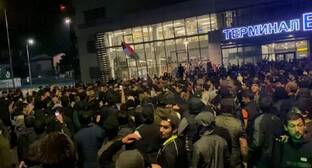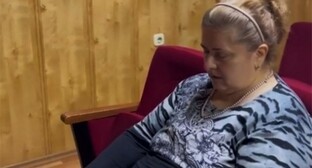20 November 2017, 09:00
Week in the Caucasus: review of main events of November 13-19
"Kunaki" film festival in Abkhazia; earthquake in Azerbaijan; arrival of more than 40 women and children in Grozny from Syria, – see the review of these and other events in the Caucasus during the week of November 13-19, 2017, prepared by the "Caucasian Knot".
In Abkhazia, "Kunaki" festival presents films about the Caucasus
In Abkhazia, on November 15, the 11th "Kunaki" Film and TV Festival was opened. It got its name in 2016 in honour of the Caucasian concept of "kunachestvo", i.e., hospitality and friendship between people of different nationalities and religion. This year, organizers of the film festival abandoned feature films. According to Ilyas Bogatyryov, the director of the film festival, films of directors from the Caucasus take less than a quarter of the main programme. Ilyas Bogatyryov associates that fact with the "low professional level" of festival participants from the region.
On November 18, three films about the Caucasus were screened. The film "Why a Mouse Has a Tail" describing a story of a family in which a husband is a Muslim and a wife is an Orthodox believer caused different assessments of the audience. On November 19, the festival presented the film "A Man Needs a Tower for Life" about Ingushetia directed by Georgy Sushko, and the film became a favourite of the day. The film festival unites the people and allow them to learn more about their history, noted the viewers interviewed by the "Caucasian Knot" correspondent.
In Azerbaijan, earthquake damages more than 200 buildings
On November 15, an earthquake with a magnitude of 5.1 occurred in Azerbaijan. Residents of Nagorno-Karabakh also felt the earthquake. A resident of the Terter District suffered when a farm building collapsed. Besides, 127 houses in the Agdam District and 100 houses in the Barda District were damaged. In the Terter District, the damage to buildings was registered. On November 16 and 17, new earthquakes occurred 21 kilometres south of the city of Barda. Residents of the southern regions of Armenia and Azerbaijan also felt the tremors.
In Sochi and Volgograd, 33 people fell victim to two major fires
During a week, two major fires occurred in Southern Russia. On November 14, in Sochi, a fire killed a person in a hostel, and 30 others were injured. Residents of Sochi blamed officials for the fire. The city residents explained they had ineffectively complained to the Mayoralty about unsanctioned accessory buildings, from one of which a fire started. According to the Ministry for Emergencies (MfE), the fire in an accessory building could arise because of careless handling of fire.
On November 16, in the Dzerzhinsky District of Volgograd, a warehouse of paint and varnish products was destroyed by a fire. There was a threat that the fire would spread to apartment buildings. A woman, born in 1987, was killed by the fire, and another woman, born in 1989, suffered.
SC mitigates verdict to a Sochi woman in case on high treason for sending SMS to Georgia
Advocate Ivan Pavlov, the leader of the "Team 29", has reported on the decision of the Supreme Court (SC) of Russia to reduce the sentence to Inga Tutisani, a resident of Sochi, down to 4 years and one month. She was sentenced for high treason for sending an SMS to Georgia about the movement of Russian troops in August 2008. The sentenced woman has already served the term, and she will soon be released, reports Ivan Pavlov. He has also mentioned that Inga Tutisani, recognized by the Human Rights Centre (HRC) "Memorial" as a political prisoner, was sentenced under circumstances similar to those under which three other women Oksana Sevastidi, Annik Kesyan, and Marina Djandjgava were sentenced, who were later pardoned by the Russian President.
In Yerevan, students stop their strike after adoption of law on abolition of army service postponement and meeting with MPs
On November 15, Armenia adopted a law to abolish an academic postponement from the army service. The law is to enter into force three months later. The students, who went on strike against the above law on November 7, blocked the avenue near the Parliament and clashed with the police. The Speaker and the Vice Speaker of the Parliament promised to discuss with the students the issue of the army service postponement. After that, the students agreed to stop their protests.
More than 40 women and children brought to Grozny from Syria
On November 13, 41 women and children were brought from Syria to Grozny. Their number includes 34 natives of the Russian regions, such as Chechnya, Dagestan, and Ingushetia. This was reported by Ramzan Kadyrov. There are no guarantees that women will not be held criminally liable. They have signed letters stating that they are ready "to appear in court, if necessary," noted Ziyad Sabsabi, a representative of the Chechen leader. The women confirmed to their relatives that they could return to Russia after expressing their consent to criminal prosecution. They were questioned by law enforcers, and then they left with their relatives. On November 14, it became known that law enforcers detained three women from Dagestan, who flew from Syria to Chechnya. One of them is on the wanted list in Moscow.




